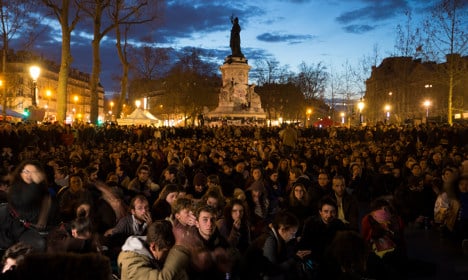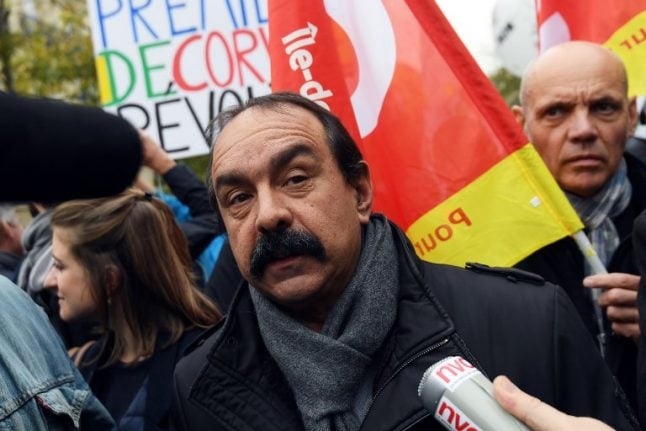It wasn't immediately clear if Monday morning's evacuation (see tweet below) of the famous square in Paris meant protesters would be forbidden from returning as they have done each evening for the last 11 nights.
What is clear though is that the “Nuit Debout” (which roughly translates as “Rise Up at Night”) movement appears to be growing in strength rather than dying out and the authorities in Paris are unlikely to risk barring them from their headquarters just yet.
Following the evacuation, which removed the wooden fences and structures built by protesters, the organizers of Nuit Debout immediately vowed to return for a 12th night.
In the heady new world of “Nuits Debouts” it was March 40 on Saturday to the some 2,000 people gathered in a main Paris square to share their aspirations for change.
France's #nuitdebout movement shows no signs of stopping after 11 nights of protests. pic.twitter.com/kXkcmDMc3k
— The Local France (@TheLocalFrance) April 11, 2016
It is their way of keeping track of a protest movement that has seen people flock to the Place de la Republique to air their grievances, seek strength in numbers and strategise for a better future every night since March 31st.
While galvanized by weeks of protests over the Socialist government's labour reforms seen as threatening workers' rights, the separate Nuit Debout movement is an omnibus of causes.
#NuitDebout Evacuation en cours dans le calme (photos @elodie_herve @maud_pierron) #République #Paris pic.twitter.com/hQ26OFVKdB
— N. Quester-Séméon ن (@NatachaQS) April 11, 2016
Participants may be fighting for the environment, against Islamophobia and homophobia, for better housing, against unhealthy food – or all of the above.
In the wake of the November jihadist attacks in Paris, many are also opposed to the state of emergency that remains in effect.
Nuits Debouts, which began in Paris and now picked up to around 50 other cities across France, as well as to Belgium and Spain, means occupying central city squares overnight and vacating them in the morning.
'Without political demands, the movement will die out'
“Get Indignant!” is painted on a paving stone in the vast Paris square, a nod to Spain's Indignados, who gave rise to the far-left Podemos party.
Nuits Debouts also emulates the anti-capitalist Occupy movement and Greece's anti-austerity 700 Euro Generation.
nuits debouts#teamtoussaint pic.twitter.com/yeVB5Lr61r
— Pigale Anouk (@Apigale) April 11, 2016

“We haven't seen this for a long time,” said Emeric Degui, 33, an activist with Desobeir (Disobey). The protests against the labour reforms have “awakened awareness”.
The atmosphere is festive, with street theatre and music, a variety of food stalls and many people swigging beers.
But the organization is disciplined, with daily general assemblies and a variety of committees handling practical and political themes.
Speakers take turns at the podium supposedly limited to two minutes, though prominent economist Frederic Lordon, one of the instigators of the movement, took a bit longer, receiving a thunderous welcome.
“Something is arising,” he said. “We are doing something. But what? Without political demands, the movement will die out.”
 (A woman speaks to the crowd at a “Nuits Debout” gathering in Perpignan, south west France. Photo: AFP)
(A woman speaks to the crowd at a “Nuits Debout” gathering in Perpignan, south west France. Photo: AFP)ATMs at banks near the Place de la République targeted by Nuit Debout protesters in Paris. pic.twitter.com/rggbjuU4eE
— The Local France (@TheLocalFrance) April 11, 2016
 (Protesters hang an effigy of PM Mnauel Valls from the staue in Place de la Republique. Photo: AFP)
(Protesters hang an effigy of PM Mnauel Valls from the staue in Place de la Republique. Photo: AFP)



 Please whitelist us to continue reading.
Please whitelist us to continue reading.
Member comments